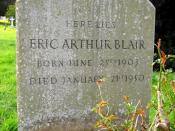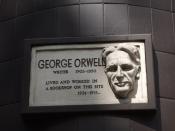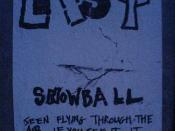1. George Orwell is the pen name of Eric Arthur Blair. Orwell was born on June 25, 1903 in Motihari, India. Orwell's parents were members of the Indian Civil Service, and, after an education at Eton College in England, Orwell joined the Indian Imperial Police in Burma, and later wrote Burmese Days (1934), a book about his experience. After living in Burma for a few years, he wrote Down and Out in Paris and London (1933), a nonfictional account of several years of self-imposed poverty he had experienced. He than wrote three other novels in the 1930's: A Clergyman's Daughter (1935), Keep the Aspidistra Flying (1936), and Coming Up for Air (1939). After fighting for the Loyalists in the Spanish Civil War, Orwell wrote Homage to Catalonia (1938), a book about how he was wounded and when the Communists attempted to eliminate their allies on the far left, fought against them and was forced to flee for his life.
There are a few reasons why Animal Farm (1945) and Nineteen Eighty-Four (1949) were written. One of the reasons were to reflect his lifelong distrust of autocratic government. Orwell found most of his material for his books from his own life. On the basis of first-hand experiences, he developed his belief that power not only corrupts but also breeds an ever-increasing desire for more power. He wrote the book Nineteen Eighty-Four to be a warning but it ended up being a prophecy. Orwell died a year or two after Nineteen Eighty-Four was 2a. The animals' Seven Commandments are the following: A. Whatever goes upon two legs is an enemy.
B. Whatever goes upon four legs, or has wings, is a friend.
C. No animal shall wear clothes.
D. No animal shall sleep in a bed.
E. No animal shall drink alcohol.
F. No animal shall kill any other animal.
G. All animals are equal.
2b. The animals follow the philosophy of Old Major, the prize Middle White boar.
They followed his philosophy because he was old and lived a long life. Also, in his lifetime he became very wise and understood almost all of life's lessons. All of his teachings became known as Animalism.
2c. The significance that I tie to the milk incident is that Napoleon took it to use for the pigs' needs. He placed it in the pigs' mush and said that it and the apples had substances in them that were needed for the well being of the pigs. Also, this was one of the first incidents that happened to show that the pigs had more power over the other animals. Since the pigs would be running the farm, they needed it to have a good diet and the live a healthy life.
3. The two adjourning farms are Foxwood, which is owned by Mr. Pilkington, and Pitchfield, which is owned by Mr. Fredrick.
3a. Mr. Pilkington was an easygoing gentlemen farmer who, according to the season, spent most of his time either fishing or hunting. Mr. Fredrick was a tough, clever man who was continuously involved in lawsuit and had a name for driving hard bargains. Mr. Pilkington and Mr. Fredrick detested each other so much that it was difficult for them to come to an agreement, even in defense of their own interests.
3b. The conditions of the two farms were totally different. Foxwood was a large, belittled, old-fashioned farm. This farm was neglected because it was much over grown by woodland, with all its pastures worn out and its hedges in a disreputable state. Pinchfield was a smaller and better-kept farm.
4a. Propaganda is the spreading of ideas, information, or rumors to further or damage a cause. Also, it can be used to help or injure an institution, a cause, or a person.
4b. There are five examples of propaganda techniques used in Animal Farm. The first example is that Squealer told everyone that Boxer was going to a veterinarian when he actually was going to the knacker's to be slaughtered and made into glue.
Another example is when the pigs got drunk, Squealer told that animals that Napoleon was dying when he just had a "hang over" for drinking. The third example is when they wrote the Seven Commandments on the side of the barn and changed them to suit the pigs' needs. Also, Napoleon blamed everything on Snowball so that the animals would favor him over Snowball. The fifth example is when Napoleon told the other animals that the pigs were receiving all the milk and apples because they contained substances that were necessary to their health and so they could successfully manage the farm. The final example is when they placed sand under the grain so that it looked like they had a good harvest, when actually they did not.
5. Animal Farm became a totalitarian state because the pigs were beginning to take over the farm. Any animal that did not obey one of the Seven Commandments were either murdered or ran off the farm by the dogs. Napoleon bends the rules to suit the needs of him and the other pigs, not the other animals. When one of the animals think they know the commandment to be something different, Squealer and Napoleon make sure to convince them that they are wrong and that the commandment was never changed.
6. Napoleon was the character that I believe reminds me of a person that I have read about. He reminds me of Joseph Stalin. One of the reasons why Napoleon reminds me of Stalin is because he acted as if he did not want the windmill built, but than when Snowball was ran off the farm, he decided to tell all the animals that it was his idea to built the windmill and that he wanted it built. Stalin also took credit for something that Trotsky introduced, even though it appeared that Stalin did not like the idea. Another thing is that Napoleon exiled Snowball from the farm, the same as Stalin did to Trotsky. Napoleon and Stalin both bestowed titles upon themselves and preformed mass murders. The were mass murderers but they kill all the people that supported someone other than themselves. At first, they both seemed to be very good leader, but then they were soon over come with greed and became power-hungry. In the end, it turned out that Napoleon, like Stalin, made the commonwealth suffer, so that they could live in luxury.





